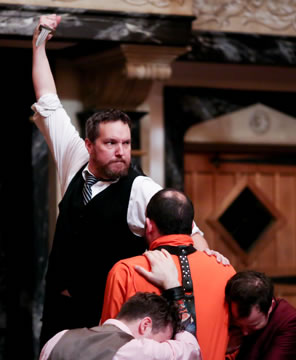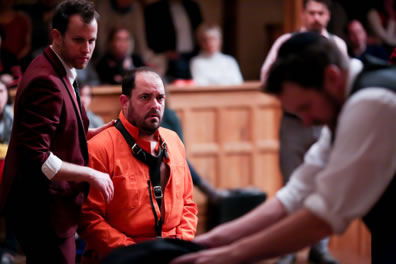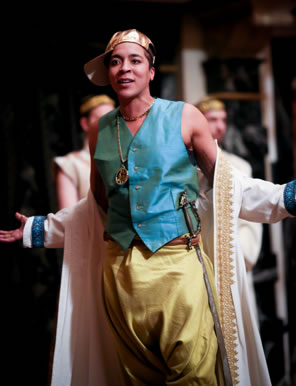The Merchant of Venice
The Perspectives of Just Deserts
American Shakespeare Center, Blackfriars Playhouse, Staunton, Virginia
Saturday, January 21, 2017, C–6&7 (center stalls)
Actors' Renaissance Season

"Tarry a little!" Shylock (John Harrell) pauses in the act of extracting his bond from Antonio (David Anthony Lewis in orange prison garb) as Bassanio (Josh Innerst in gray vest) and Gratiano (Chris Johnston) prepare for the worst in the American Shakespeare Center's Actors' Renaissance Season production of William Shakespeare's The Merchant of Venice at the Blackfriars Playhouse. Photo by Lindsey Walters, American Shakespeare Center.
This is a Merchant of Venice that illustrates how Shylock is both a victim and a product of racism. This is a Merchant of Venice that depicts Antonio as the epitome of Christianity—and I mean that as complimentary to him. This is an American Shakespeare Center (ASC) Actors' Renaissance Season production (actors with no directors or production team mounting a play with a week's rehearsal) of William Shakespeare's play that lacks cohesiveness as some portrayals end up wandering in the wilderness, but a couple of bit parts rise to the topmost elevations of great Blackfriars Playhouse moments.
This is the third production of Merchant that we've seen in the past year, and the previous two set high standards. Last summer I saw Shakespeare's Globe's touring production directed by Jonathan Munby and featuring Jonathan Pryce as Shylock and his daughter, Phoebe Pryce, as Jessica (Number Seven on my year-end Top Shakespeareances list). That production juxtaposed intense racism with the reactions of those who endure it and the fissures in a society that propagates it. Pryce, I wrote, "may be the finest performance of the role I've ever seen for its purity of character." That standard was smashed within months with the Faction of Fools commedia dell'arte production (Number Three on my year-end Top Shakespeareances list). Paul Reisman's direction reveals how much of this play relies on commedia conventions and could have been staged originally in commedia dell'arte style. It's hard for me to see another, more traditionally staged Merchant so soon after without feeling that some characterizations miss their mark. Meanwhile, Matthew Pauli, I wrote, "using expert verse readings and great subtlety of character, presented one of the most fully fleshed Shylocks I've ever seen, despite playing him in a Pantaloon's mask" (quoting from my year-end review).
The problem with such definitive statements is that great actors subsequently taking on great parts bring their own singular qualities to the role, further enhancing our understanding of the character. John Harrell, who undertakes Shylock in this ASC staging, is one such actor. Harrell usually combines his Shakespearean intelligence with a wry wit and droll delivery, even in roles that are not traditionally comic (such as Hamlet). Harrell doesn't find Shylock funny, however. He finds him angry from the start, unleashing his vitriol in describing Antonio's behavior toward him on the Rialto. "How like a fawning publican he looks," Shylock says upon first encountering Antonio in this play. "He hates our sacred nation, and he rails, even there where merchants most do congregate, on me, my bargains and my well-won thrift, which he calls interest. Cursed be my tribe, if I forgive him!" It is this anger at the racism he constantly encounters that ultimately leads him into Portia's trap when he seeks a pound of Antonio's flesh for forfeiture of his bond of debt. Shylock insists that society uphold the letter of the law, down to the fact that his bond with Antonio doesn't mention a surgeon being on hand to stop Antonio's bleeding; he forgets that the bond doesn't mention blood, either, let alone a right to spill any when he retrieves that pound of flesh.
Shylock's anger not only guides Harrell through his portrayal, it also is reflected in the population through which the Jew navigates. In Shylock's "hath not a Jew" speech, while Salerio (René Thornton Jr.) scoffs at the beginning before growing alarmed at the end, Solanio (Tim Sailer) stands malevolently unbudging with his arms crossed throughout the speech, then gives Shylock a rough shoulder bump as he departs. Sailer's Solanio hears the truth: he just doesn't care. For the trial scene, Shylock entering the courtroom has to physically slalom through a host of hatred before nervously making his case. He uses his fear and frustration to give thrust to his confidence going forward. "What judgment shall I dread, doing no wrong?" he pleads. It's a poignant point as we know that, even today, a person of the minority class bringing a case of law against a ruling class member is often turned into the guilty perpetrator, no matter the legal basis. Shylock's argument incisively resonates, both then in the renaissance Venetian courtroom and today in the court of public opinion; but logic simply doesn't matter to racists.
It does matter to Valentine as played by David Anthony Lewis. In 17 previous stage productions I've seen plus the film starring Jeremy Irons in the part, I don't recall ever seeing an Antonio who was not portrayed as representative of institutional evil: Oh, and he's almost always gay, using text references to make a homosexual longing for Bassanio as the cause for his sadness at the play's start. I've never considered Antonio as anything other than a man suffering depression in and of itself, and that's exactly how Lewis plays the opening scene (thank you, thank you, thank you). In fact, a key line in that scene (as if the opening line perfectly describing depression weren't enough) comes when Solanio says, "Then let me say you are sad because you are not merry," to which Lewis reacts with a "there you have it" gesture.
Yet, here's a connection I have never made before: Christian doctrine doesn't merge with the realities of depression, a conflict I've had to deal with my entire adult life. And Lewis presents Antonio as the most Christian of the Christians, pure in his piety though indoctrinated by his church's dogmatic attitudes toward non-Christians. Clues of Antonio's Christian-oriented behavior abound, most notably in the way he enables Bassanio, how he rescues some of Shylock's clients from his financial clutches, and his acceptance of death shrouded in biblical imagery heading into the trial. "I am a tainted wether of the flock, meetest for death," he says. "The weakest kind of fruit drops earliest to the ground; and so let me." Before the trial scene comes a moment when the bankrupt and jailed Antonio tries to speak with Shylock, who refuses to hear him. It struck me in this production—in Lewis's bearing of calm acceptance—that we never hear what Antonio intends to say to Shylock. All he gets out are mild solicitations: "Hear me yet, good Shylock" and "I pray thee hear me speak." Perhaps it is our own reactionary-racist attitudes that lead us to automatically assume Antonio is intending some hypocritical juju here.

Gratiano (Chris Johnston, left) and Antonio (David Anthony Lewis) watch Shylock (John Harrell) at the end of the trial scene as Bassanio (Josh Innerst) and members of the Blackfriars Playhouse audience look on in William Shakespeare's The Merchant of Venice. Photo by Lindsey Walters, American Shakespeare Center.
Lewis turns the trial scene into Antonio's moment of redemption, a realization of how un-Christian he has been toward his fellowman. He not only has heard Portia preach on mercy, he has heard Shylock preach on justice. People in an ultrareligious state of mind—such as a born-again experience—tend to swing to extremes, and so does Antonio. As the trial turns against Shylock, Antonio behaves in what he would consider an exemplary act of grace: to bring Shylock to Christ and to restore the Jew's relationship with his eloped daughter, Jessica. People of other faiths, as well as atheists, agnostics, and secularists decry Antonio's demand for Shylock's conversion as abusive, but Antonio is indoctrinated in Christian dogma (which is not necessarily Jesus's sentiment, by the way, nor is it peculiar: other faiths have conversion tenets in their doctrine). He sees his gesture as Christian benevolence, which he shows again by restraining Gratiano (Chris Johnston) from further abusing the Jew.
His sense of redemption informs Antonio's behavior for the rest of the play. What is Bassanio's ring but a trifle—even if received as a vow of faith—in the face of gratitude to the judge? Lewis's Antonio also spends much of the final act giggling as Portia (Ginna Hoben) and Nerissa (Allison Glenzer) punk their husbands about their missing rings. Having been reprieved from certain death and redeemed by God, Antonio can now laugh at lovers spatting over lost rings (but he, with Bassanio and Gratiano, is shocked to learn Portia was the judge).
Hoben lays the foundation of her portrayal of Portia in Portia's impersonation of the judge: she's a steady, mature-for-her-years woman. She even approaches romance with pragmatism, but yet has a giddy sense of humor and calls upon her considerable wiliness when needed, like slipping into a sleek, lead-colored evening gown before Bassanio makes his choice of chests (she now knows lead is the winning casket). Josh Innerst plays Bassanio as a rascally charming con artist with a high stud quotient. It's clear, though, that he's no match in scheming to Portia, which we see in the final scene when he notably declines to try to lie his way out of having given away her ring. Bassanio's chest-choosing deliberation is the play's thematic keynote speech, addressing the merits of inner worth versus gaudy show, and Innerst's delivery pegs the moment to its rightful place of importance—even as the character himself is, self-admittedly, nothing but ornament. The revelation that he has picked the right chest inspires the audience into relieved applause, a credit to how Innerst and Hoben (who squeals) winningly portray their characters.


Morocco (Jessika Williams, top) and Arragon (Benjamin Reed) in The Merchant of Venice at the Blackfriars Playhouse. Photos by Lindsey Walters, American Shakespeare Center.
Lauren Ballard as Jessica and Benjamin Reed as Lorenzo have come up with some nice, character-defining moments, too. When Reed's Lorenzo arrives at Shylock's house to steal Jessica away, she emerges in disguise even as he's singing her praises to his cohorts; but he doesn't recognize her at first as he continues bragging on her. This points to Lorenzo's sincere love for the person of Jessica and not just her wealth (though, the wealth she brings along certainly is good gravy). When Gratiano welcomes the couple to Belmont as "Lorenzo and his infidel," Ballard flips him an angry middle-finger salute. It gets a laugh and displays Jessica's emerging inner conflict with her sense of self (Ballard spends much time pondering the crucifix hanging around her neck). The couple's footing is not quite so sure the rest of the way, though I don't think Shakespeare's footing is quite so sure in depicting Lorenzo and Jessica, either: Is the "music of the night" scene tender ribbing or naked disaffection? This conundrum emerges in Ballard's and Reed's performances, who, working from the text on short rehearsal time, try to have it both ways.
Reed does steal a star moment, but in a completely different role: the Prince of Arragon, the second of the three chest-choosing contestants. Already, Jessika Williams has set a high bar with the Prince of Morocco. Wearing gold-trimmed robe, blue vest (no shirt), baggy gold sultan pants, ornate scimitar, and a gold baseball cap skewed sideways on her head, Williams engages a cocky talk and cocky stalk as her Morocco regards the three chests—gold, silver, and lead—and analyzes their inscriptions with a Kanye-sized ego. Of course this Morocco is going to choose the brightest bling among them. What's amazing is how perfectly Shakespeare's penned lines hit with this hip-hop interpretation of Morocco.
And so, too, with Reed's interpretation of Arragon as a Comic Con geek: wizard's hat, brown-framed thick glasses, plastic light saber, a "Choose Your Weapon" t-shirt, gray sweatpants, and a purple cape that serves as his invisibility cloak on the line, "If I do fail in fortune of my choice, immediately to leave you and be gone." Reed holds the pose of being invisible for several moments, his Arragon proving the cape's effectiveness while the other actors try to keep from corpsing. Reed's lisping line reading is not so much a speech impediment (and we're in my personal territory in that regard, having dealt with that condition in my younger years) but the uncultured, social gracelessness of a boy-man who never leaves his basement den—even in his mind when his body is out and about. And wow! does this choice of portrayal ever fit the lines Shakespeare wrote, especially after Arragon lights on the silver chest's inscription, "Who chooseth me shall get as much as he deserves."
"Let none presume to wear an undeserved dignity," Reed's Arragon cries. "O, that estates, degrees and offices were not derived corruptly, and that clear honor were purchased by the merit of the wearer! How many then should cover that stand bare! How many be commanded that command! How much low peasantry would then be glean'd from the true seed of honor! And how much honor pick'd from the chaff and ruin of the times to be new-varnish'd! Well, but to my choice: 'Who chooseth me shall get as much as he deserves.' I will assume desert." It's a heroic moment, both in this Arragon's little mind and in the annals of acting at the Blackfriars Playhouse where we have seen Bottom's Pyramus killed by a patron's foot odor, Falstaff tending the theater's bar cart as he soliloquizes on sack, and a fat-suit-wearing Epicure Mammon in The Alchemist doing the splits as he sings "Business Time." Arragon's prize? "The portrait of a blinking idiot," an emoji, one eye winking and its tongue sticking out.
Sometimes in these Actors' Renaissance Season productions, the plays either don't quite click or take awhile to get their footing. Nevertheless, many of the actors are so well versed with Shakespeare and other early modern theater that always some several deliver insightfully searing performances. Such happens here, from the redeemed Christian merchant to the abused-to-vengeance Jew, and from the hip-hop Morocco to the nerd Arragon, too.
Eric Minton
January 28, 2017
Comment: e-mail editorial@shakespeareances.com.
Start a discussion in the Bardroom



 Find additional Shakespeareances
Find additional Shakespeareances